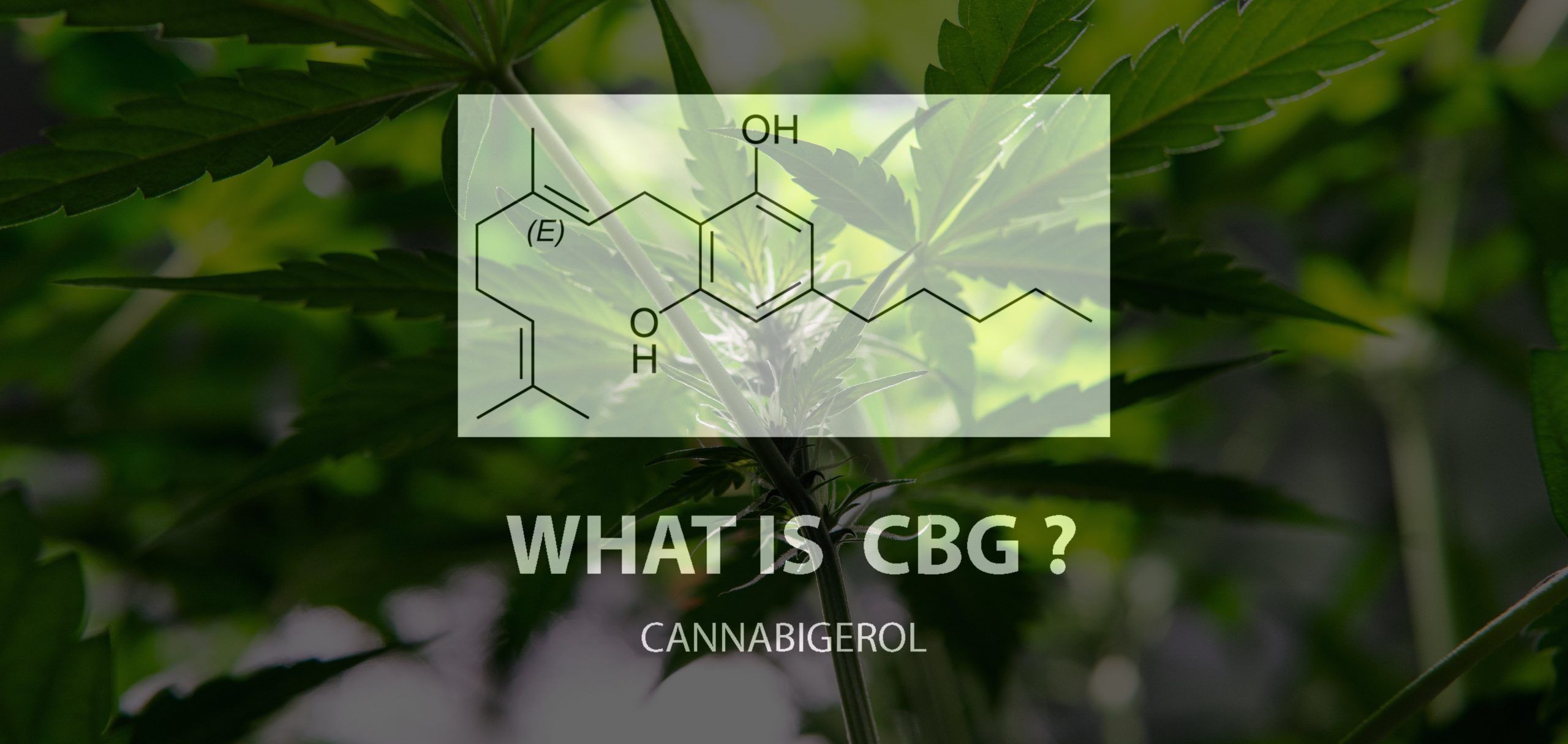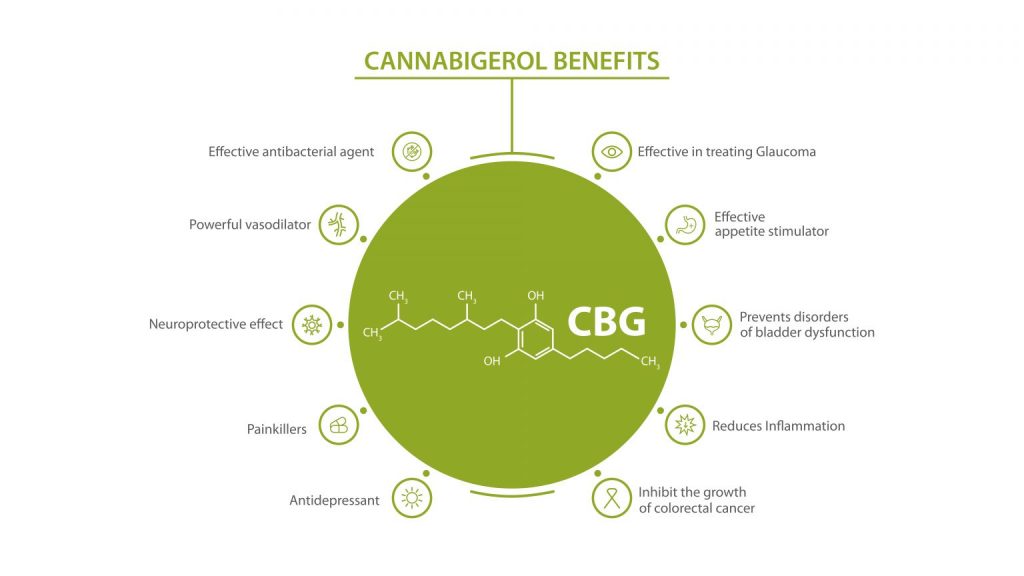
While tetrahydrocannabinol (THC) and cannabidiol (CBD) continue to get the spotlight in the world of cannabinoids, there’s another one that’s starting to capture the collective imagination: CBG.
CBG — short for “cannabigerol” — is quickly joining the ranks as one of the coolest compounds in cannabis. Below, we’ll cover:
- What is CBG?
- What effects does CBG have?
- Are there benefits to CBG?
- How are CBG and CBD different?
- Is CBG intoxicating?
- What’s the best way to ingest CBG?

What is CBG?
CBG is a chemical component of cannabis. There are plenty of such components, known as cannabinoids, ranging from the trippy party animal, THC, to the studious do-gooder, CBD, to others like CBN and CBC.
Specifically, CBG is a phytocannabinoid, which specifies that it’s produced by plants instead of by the human body (this latter group is called endocannabinoids). When we encounter CBG, it’s in the form of an extract. This extracted CBG mainly originates from the hemp plant.
Just in case you don’t know the difference, think of it this way: hemp and marijuana are both cannabis plants, but they’re quite different from one another. They grow in different climates, face different regulations, and produce wildly different cannabinoid profiles. Marijuana produces usable quantities of THC, which gives weed its psychoactive effect. Hemp, however, contains only trace amounts of THC — legally, no more than 0.3%.
Check out our eight recommended books to find out more about cannabinoids like CBD and CBG.
If the idea of trying CBG out excites you, you’re most likely going to encounter it as an oil.
CBG oil is simply CBG combined with an oil base like hemp oil or coconut oil. The reason it’s suspended in an oil as opposed to water is that cannabinoids are fat-soluble (non-polar), so they’d separate from water.
Ingesting CBG oil is simple: you place a couple of drops under your tongue and hold it there for a minute to let the hypervascular area under your tongue absorb it. Then swallow.
What Effects Does CBG Have?
As a phytocannabinoid compound, CBG is uniquely set up to interact with our bodies. That’s because our bodies come equipped with an endocannabinoid system, which gives us receptors to receive and process cannabinoids.
Our endocannabinoid systems are mind-blowing. They are complex systems of cell signaling that reside within our bodies. And they’re one of the reasons we enjoy homeostasis (that tendency of humans to always equilibrate back to a stable, functioning state, no matter the circumstances).
As you can probably guess, anything that’s tied into our general bodily functioning is also tied to things like our memory, mood, sleep, inflammation, immune system, and more.
Taking an endocannabinoid like CBG allows this chemical to bind to your endocannabinoid receptors, which are located in your central and peripheral nervous system. CBG (and other cannabinoids like CBD) are like keys — they unlock the receptors and allow the system to do its job, keeping you healthy and your bodily functions regulated.
Are There Benefits to CBG?
In short, absolutely.
If you’re familiar with CBD, consider that CBG has many of the same benefits:
- Long-acting relief of anxiety and stress
- Relief from nausea
- Anti-inflammatory effects, which help conditions like psoriasis, irritable bowel syndrome, and arthritis
- Improved immune system functioning
- Faster and more thorough muscle healing and recovery
- Animal studies have shown that cannabigerol treats glaucoma (though this hasn’t yet been studied in humans)
How Are CBG and CBD Different?
So clearly, there’s a pretty close relationship between CBG and CBD. Why not just take CBD then?
Well, it turns out there are some pretty key differences that may interest you. First off, CBG is different from CBD in its chemical structure, and it only comprises ≤1% of the hemp plant — that’s far less than CBD, which is abundant in hemp.
Research on CBG still needs time to catch up, but early results are suggesting that CBG might beat CBD in terms of benefits when it comes to certain conditions:
- Nausea: So far, results indicate that CBG may help reduce nausea more effectively than CBD.
- More GABA production: GABA, an inhibitory neurotransmitter associated with calming stress and anxiety, is produced by the brain. Taking CBG may help our brains produce more GABA, which means it could be more effective than either THC or CBD in relieving stress.
Is CBG Intoxicating?
CBG does a lot of things, but one thing it will not do is get you high.
Scientifically speaking, CBG is classified as “non-psychotropic.” That means it contains no properties that will get you intoxicated or induce a sense of euphoria. It also will not alter your mood or cognition abilities in any way that would compromise your ability to perform essential daily activities.
What’s the Best Way to Ingest CBG?
There are several ways you can take CBG. When you choose between them, it’s recommended that you choose a full-spectrum product, which means that other cannabinoids other than the one named will be present.
For instance, you’ll often find CBG present in full-spectrum CBD products. Because they’re full-spectrum, the extraction process doesn’t remove other cannabinoids from the final product. Additionally, you’ll receive all the health benefits of CBG plus those of CBD and other cannabinoids in the product.
You can try any number of different methods:
- Oils/tinctures
- Edibles
- Capsules
- Topicals
- Vapes
- Smoking
Perhaps the best starter is CBG oil. This method only requires you to drop a couple of drops under your tongue, hold it there for a minute, then swallow it. It also ensures that a high percentage of the CBG actually makes it into your bloodstream.
To Sum It All Up
CBG is a less-known but extremely exciting cannabinoid. It’s a booster for your endocannabinoid system that helps your body self-regulate and maintain homeostasis.
It doesn’t get you high, but it does improve things like your sleep, mood, and immune system and may help with problems like inflammation and nausea. It’s a different compound from CBD, but it’s formed by the cannabis plant and is similar in many regards. However, it may work better for certain conditions — more research will clarify this.
So if you’re ready to try something new and exciting, there’s no better way to be on the cutting edge than getting into CBG.







[…] with other cannabinoids starting with “C,” CBG is another non-psychoactive cannabinoid with potential medical benefits. These include […]